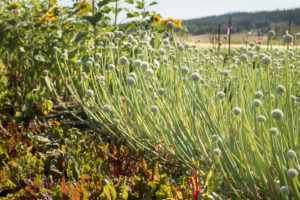
As we close out what has been arguably one of the wildest years in memory, it is important to reflect on the lessons learned, the work done, and the opportunities and challenges that are ahead. The spring of 2020 saw unprecedented demand for seed as the realities of the COVID-19 pandemic started to take hold. In response, many people dove headfirst into growing their own food.
But it wasn’t just gardeners who were buying seed last spring. Organic farmers have been dealing with the issues of access to organic seed for some time now. A large portion of organic farmers still obtain about half of their seed from conventional (non-organic) sources. This new influx in demand for organic seed is driving an already strained market to seek new solutions. Many seed companies have now reported 2 to 10 times the amount of sales in 2020 as compared to previous years. And this trend appears to be continuing as we enter 2021.
OSA’s ongoing efforts to help meet the increasing demand for organic seed are underway both in California and nationally. But what does meeting this demand look like? As with most sustainable solutions, there isn’t a silver bullet approach that will solve this supply problem. Providing training and support for new seed professionals is one promising way to address the supply shortage.
One of the issues seed companies have been facing is the lack of experienced seed producers to contract with. These relationships are developed over time and require communication, credibility, and trust. As more and more farmers are reaching the age of retirement, there is an opportunity for growers who want to leap into beginning, or expanding, organic seed production or sales.
As part of an ongoing project to increase organic seed production in California, Organic Seed Alliance is partnering with William Rosenzweig, co-chair of the Sustainable Food Initiative at Berkeley Haas School of Business, to present the Organic Seed Entrepreneurship Intensive for California-based producers.
This intensive is intended to provide tools, training, expertise, and individualized support to qualified candidates. The intensive will be conducted virtually over two consecutive weekends and culminate with a strategic planning session where individuals will have an opportunity to workshop their business plan with a skilled entrepreneurship educator. Accepted candidates can expect entrepreneurial insight, individualized support, expertise, and industry navigation.
This course will have limited enrollment, with participants selected based on their applications. Participants must be based in California.
Ideal Candidates
- Intend to use the intensive to launch or expand an organic seed business venture
- Exhibit a strong entrepreneurial mindset
- Will be growth-oriented
- Are focused on “the next opportunity”
- Will tend toward innovation over incrementalism
- Have prior experience with or a passion for organic seed
- Are based in California
Additional Details
- What: California Organic Seed Entrepreneurship Intensive
- Who: Organic Seed Alliance, William Rosenzweig, and the California Department of Agriculture
- When: April 3rd, 4th, 10th, and 11th, 2021
- Where: Virtually
- Cost: $50 for attendance
Application period closes March 1, 2021.
Financial aid will be available to cover the cost of the course for those who need it. Registering in the course will also allow successful participants to apply for small “catalyst grants” to help execute their business plans.
This project is made possible thanks to grant funding from the California Department of Agriculture.
For more details or questions, please contact Jared Zystro.

